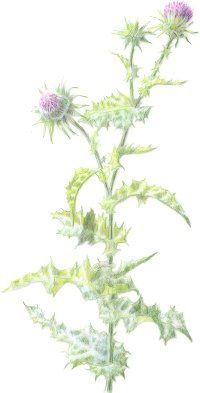In addition to preventative healthy eating, some herbs stimulate the gallbladder, promoting the flow of bile.
Dandelion and milk thistle are particularly useful. They contain bitter substances -- taraxacin in dandelion and silymarin in milk thistle -- that stimulate bile production.
Increasing the amount of bile produced decreases its concentration. And the greater volume is also more likely to flush out a stone.
These herbs can be taken as tea or tincture or eaten steamed. Trim the sharp edges off young milk thistle leaves. Mix them with dandelion greens and steam as you would spinach; you can even eat them raw.
Oregon grape enhances blood flow to the liver and increases bile production. It can be combined with dandelion and milk thistle in a tea. This blend is even more effective when mixed with herbs such as chamomile, marshmallow, and slippery elm, which have relaxing and soothing properties. This mixture will also help decrease gallbladder inflammation.
Rosemary stimulates bile production, too, while also eliminating any spasms that might occur in the bile duct. It is well-known for aiding fat digestion and is often used as an herb in high-fat dishes. Its flavor helps to cut the richness of fat. Several studies have shown concentrated mint oil capsules can, if taken for several months, help break down small gallstones. Wild yam is another herb that increases bile flow and is also said to lessen the pain of gallstones. Like rosemary, it is an antispasmodic herb.An ultrasound is needed to definitively diagnose gallstones. A qualified health care practitioner should monitor herbal treatment of them. Once stones have formed, they can cause urgent medical problems if they block the bile duct. In that case, surgery may be necessary. But if surgery is not needed and the they are not serious, herbal remedies can be a healthy and effective treatment for preventing and helping with gallstones. However, eating healthily to avoid getting gallstones in the first place is always advised. For more information about the subjects covered in this article, try the following links:
Eric Yarnell, N.D., R.H. (A.H.G.) is a naturopathic physician and registered herbalist in private practice specializing in men's health and urology. He is an assistant professor in the botanical medicine department at Bastyr University in Seattle and is president or the Botanical Medicine Academy. He is the author of several textbooks including Naturopathic Gastroenterology, Naturopathic Urology and Men's Health, and Clinical Botanical Medicine; He writes a regular column on herbal medicine for Alternative and Complementary Therapies. This information is solely for informational purposes. IT IS NOT INTENDED TO PROVIDE MEDICAL ADVICE. Neither the Editors of Consumer Guide (R), Publications International, Ltd., the author nor publisher take responsibility for any possible consequences from any treatment, procedure, exercise, dietary modification, action or application of medication which results from reading or following the information contained in this information. The publication of this information does not constitute the practice of medicine, and this information does not replace the advice of your physician or other health care provider. Before undertaking any course of treatment, the reader must seek the advice of their physician or other health care provider.Before engaging in any complementary medical technique, including the use of natural or herbal remedies, you should be aware that many of these techniques have not been evaluated in scientific studies. Use of these remedies in connection with over the counter or prescription medications can cause severe adverse reactions. Often, only limited information is available about their safety and effectiveness. Each state and each discipline has its own rules about whether practitioners are required to be professionally licensed. If you plan to visit a practitioner, it is recommended that you choose one who is licensed by a recognized national organization and who abides by the organization's standards. It is always best to speak with your primary health care provider before starting any new therapeutic technique.
